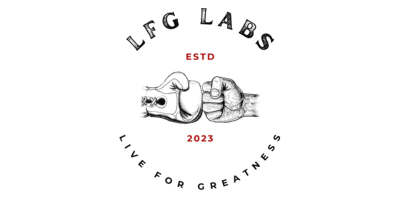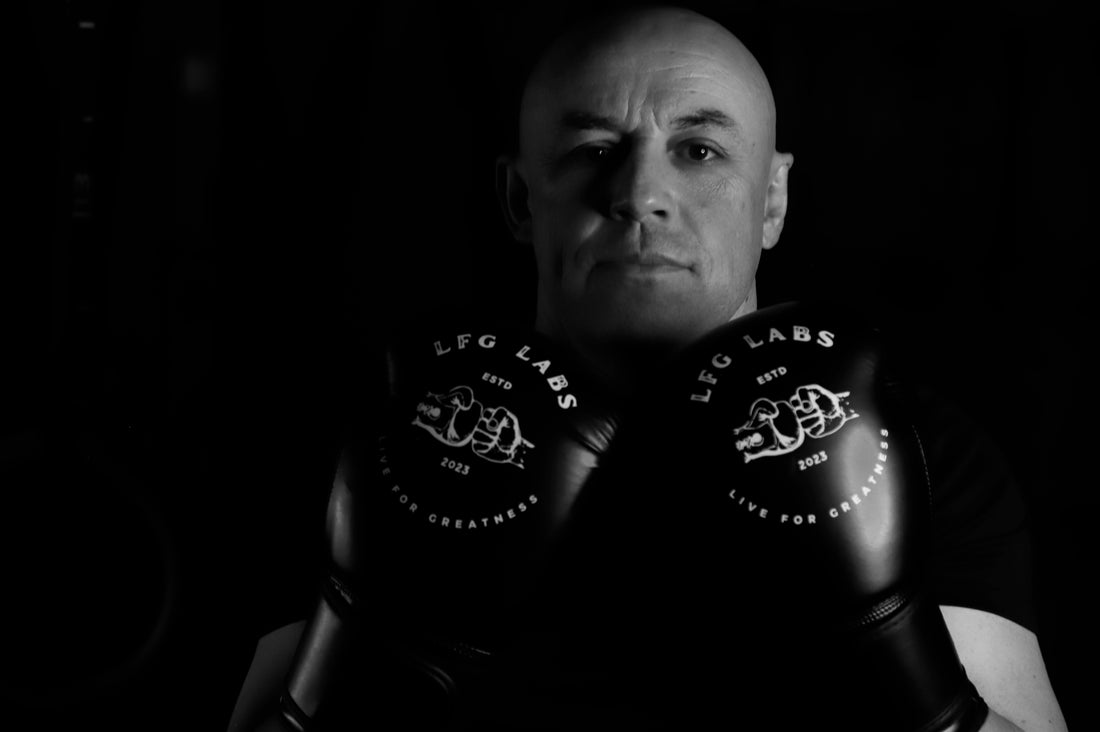Get to know our team: Barry McDonald
The Martial Arts Journey of Barry McDonald: From Novice to Elite Coach at LFG Labs
When it comes to martial arts, few names command the respect and admiration that Barry McDonald does. A former professional MMA fighter, Barry's resume is nothing short of extraordinary. As a Brazilian Jiu-Jitsu black belt, Judo black belt, wrestling coach, and boxing coach, his expertise spans a wide range of disciplines, making him a true authority in the martial arts industry. But his influence goes beyond the mat - Barry is also a fight commentator and host, bringing his deep knowledge of combat sports to audiences worldwide.
With a career dedicated to excellence, Barry has shaped the paths of numerous athletes, training multiple World, International, National, Provincial, and Regional Champions in Muay Thai and Kickboxing. His impact is felt in every corner of the sport, having coached and cornered over 1,000 fights. This article delves into the journey and achievements of a man whose passion for martial arts has left an indelible mark on the community.
This is the first installment of a three-part blog series dedicated to the life and legacy of Barry McDonald. In this opening article, we'll explore Barry's remarkable career and journey in martial arts, tracing his evolution from a young enthusiast to a seasoned professional with an unmatched depth of knowledge.
We'll delve into the formative experiences that shaped his path, from earning his black belts in Brazilian Jiu-Jitsu and Judo, to pro fighting in MMA and eventually becoming a respected coach and commentator. Stay tuned as we uncover the story behind one of the martial arts industry's most influential figures.
Part 1 - Career and Journey
- What inspired you to start a career in MMA, and how did your journey begin?
I immigrated from Scotland to Canada with my parents when I was very young, around 3 or 4 years old. I didn't have any friends or family so I joined a Community Center. I tried some sports earlier but didn't really enjoy them. All of these kids around me were like a big group and I was an outcast. But with martial arts it was different; we would come in, bow, line up all together and I really felt like I was learning something I was interested in. When I was a little kid (back in the 80s), I liked action movies such as The Karate Kid, movies about ninjas etc, and I felt it was important to learn that topic. I started with traditional Japanese Karate at about 5 years old and I competed a lot. Then I transitioned to another style of competition, a sort of light contact Kickboxing, with a continuous tournament format. When I was 11 or 12, I started boxing. I competed in Junior throughout my teenager years. And then, shortly after I watched the very first UFC, I decided to join a Judo gym.
So at that time I was training in Kickboxing, Boxing and Judo. I wanted to put everything together into one style where I could perform punches, kicks and grappling seamlessly. I then transitioned from Judo to BJJ. Everything just kind of kept evolving from there and as I got older, throughout competition and eventually MMA fights in my early 20s.

(photo: Barry McDonald and UFC Vet Nick Ring)
- Can you share what significantly shaped your path as a fighter?
I was lucky to learn from the trainers and masters I had at a young age. At that time each one of them were the most important thing in my life. To me Karate, Boxing and Judo were a consistent thing. Looking back at how great my trainers were as role models, it really taught me discipline, focus and self-control. That kind of helped carry me through everything else in life.
Being a new family to Canada in the 80s was not easy; because of this, I was just a quiet kid trying to get through school but I was treated as an outcast and got into fights with the other kids. I was always trying to sound Canadian. I was a shy kid, hesitant to talk because of my Scottish accent. I had problems with certain words so I had to filter and interpret everything before trying to say it back. It almost felt like a different language. I didn't want to fight but I felt like I had to. I fought back when I got picked on and I would be the one getting in trouble. I had to fight even when I was just trying to walk back home every day. I always felt early on that my teachers and peers were against me, except for when I went to train at the martial arts center; we were all equal there, everyone would bow and no one talked. The anxiety and fear would go away.
I remember there was a bridge between my school and my house; many times these kids were chasing me over that bridge. I fought back a lot. I remember there was a kid who was older than me and definitely more popular: him and his brother were waiting for me after school, laughing at me so I jumped out and punched the oldest brother in the face. They all started running after me on the bridge but couldn't catch me. I was probably 7 or 8. Sometimes I remember these stories as funny stories but at the time it was terrible. Being in that situation and realizing that, as a kid, this is something you're supposed to be doing for your own survival was difficult. Because of this I was moved from one school to another a couple times early on. I didn't realize how much that affected me until I had a son.

(photo: Barry McDonald and his son Cameron)
In Karate classes, we would meditate at the beginning and end of the class and it cleared our mind. I would just listen to what the Sensei was saying and then the anxiety of life would go away. The things I experienced during my childhood really set the tone for my life and I reconnected to these later on. I learned some very deep lessons in the traditions of martial arts. No one was treating me like an outcast there. I was being rewarded for what I would learn and for my belts.
So martial arts kind of always carried me through that. Those were my hard fights. The other fights, competitions, when I was more athletic and older, I would think "whether it's a hard fight or not, they're all the same". This was more about the things I would have to do to get ready for the fight. Every other thought was "I'm lucky enough to be able to compete in a sport that I chose" but all these years through grade school were hard.
- Do you recall any hard training you had to go through?
I remember the training we would do in the morning on Saturdays, 10 am to 12pm. We would do this class with a traditional lower stance that would kill our legs. We had to get our face on the wall, stare at it and not move. Our Sensei had a bamboo sword and if we lost our control or attention he would crack the ground and it would bring us back. Everyone was just terrified but I realized it was all about controlling our attention. In life the one thing we have the control of is our focus, our attention. Everything else lays on top of that and serves to blind you from it in a way. What I learned there was a lot of self-control and discipline. I brought that into everything, especially now, later in life. I was lucky to learn those lessons.

(photo: Barry McDonald and his favourite student Marina Ruggiero)
- What was the most challenging fight of your career, and how did you prepare for it both mentally and physically?
I've done so many martial arts, Karate, Boxing, Judo, Wrestling, BJJ, Kickboxing, Muay Thai, as well as combining all of them through MMA. I did pretty good competition wise, I won most of my matches. I think every event, every fight, all felt the same to me. "This is it, I have this big fight that's gonna make me better as a fighter". What was hard for me, in the amateur, was Sports Jiu-Jitsu. It was a different ruleset; Kickboxing with one minute of ground time. I competed in tournaments. I was excelling in Kickboxing and Judo so I thought I could do everything. I was used to going to the gym and Boxing. Then the next day I would do a Judo class. I won all of my Judo tournaments and most of my boxing matches.
But when I did Sports Jiu-Jitsu it was mixed and I struggled with that. I recognized that when I was striking, I couldn't grapple. Or if I wanted to do more grappling I was not striking, only grappling. So the hard part of the fights early on was combining the skills from striking to grappling seamlessly. That was the toughest thing. So when I started MMA, going in between the movements from Kickboxing to BJJ was the main skill I had to develop. However, whether it was Kickboxing, Boxing or MMA it was just "fighting a guy" for me. In training, I injured myself way more than in fights. I got choked once and I think one time my nose bled away but other than that I was pretty lucky.
- If you had to pick one martial arts, which one would you pick?
If I could only do one I would pick BJJ. The true essence of BJJ is based in self-defence, sports and no-holds-barred fighting. These are the 3 levels. If I'm in a street fight and I get attacked by a guy who is 300 pounds and he's crazy, I may be able to box him but BJJ has better answers for me to apply. And my leverage: I can choke him out, as opposed to trying to punch him or kick him, since he's bigger than me and what happens if he hits me, right? I can eliminate all of those factors because Jiu-Jistu is the answer for all self-defence. I can use BJJ to subdue someone with minimal force. If I kick him in the head, I don't know if he'll survive. Or I might even slip and fall myself. Now I'm laying on my back and I am forced to do BJJ. I worked a lot in security in my early 20s, there were many times I had to move people: so I relied on my Jiu-Jitsu, Judo and Wrestling. I never beat up anybody.

